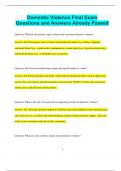Domestic Violence Final Exam
Questions and Answers Already Passed
Question: What are the primary types of abuse that constitute domestic violence?
Answer: ✔✔ The primary types of abuse include physical abuse (e.g., hitting, slapping),
emotional abuse (e.g., verbal insults, manipulation), sexual abuse (e.g., forced sexual activity),
and financial abuse (e.g., controlling access to money).
Question: How does emotional abuse impact the mental health of victims?
Answer: ✔✔ Emotional abuse can lead to long-term psychological effects such as depression,
anxiety, low self-esteem, and post-traumatic stress disorder (PTSD). Victims may experience
chronic stress and difficulty trusting others.
Question: What is the role of an advocate in supporting victims of domestic violence?
Answer: ✔✔ Advocates provide support by offering counseling, helping victims navigate legal
and social services, assisting with safety planning, and providing emotional support. They also
work to raise awareness and educate the community.
Question: What are some common myths about domestic violence?
1
,Answer: ✔✔ Common myths include the belief that domestic violence only occurs in lower-
income households, that it is solely caused by substance abuse, or that victims could leave the
relationship if they wanted to. These myths perpetuate stigma and hinder support efforts.
Question: How can schools contribute to preventing domestic violence?
Answer: ✔✔ Schools can contribute by incorporating educational programs that address healthy
relationships, providing resources for students, training staff to recognize signs of abuse, and
fostering a supportive environment for students to seek help.
Question: What are some legal protections available to victims of domestic violence?
Answer: ✔✔ Legal protections include restraining orders or protective orders that prevent the
abuser from contacting or approaching the victim, as well as legal support for custody
arrangements and divorce proceedings.
Question: What should be included in a safety plan for someone experiencing domestic
violence?
Answer: ✔✔ A safety plan should include a safe place to go, important documents and essentials
to pack, emergency contacts, a code word or signal for help, and a plan for how to leave safely
and discreetly.
2
,Question: What is the significance of the "honeymoon phase" in the cycle of abuse?
Answer: ✔✔ The honeymoon phase is characterized by the abuser's remorse, apologies, and
promises of change. This phase can create confusion and hope for the victim, making it difficult
to recognize the cyclical nature of the abuse.
Question: What are some barriers to reporting domestic violence?
Answer: ✔✔ Barriers can include fear of retaliation from the abuser, shame or embarrassment,
lack of resources or support, concerns about the impact on children, and distrust in the legal or
social support systems.
Question: How can healthcare providers help identify and assist victims of domestic violence?
Answer: ✔✔ Healthcare providers can help by screening for signs of abuse, asking direct but
sensitive questions, providing referrals to support services, and documenting injuries and
disclosures in a confidential manner.
Question: What role does economic dependence play in domestic violence?
Answer: ✔✔ Economic dependence can trap victims in abusive relationships by limiting their
financial resources and ability to leave. Abusers often use financial control to maintain power
and prevent victims from seeking help.
3
, Question: What are some effective strategies for community outreach to address domestic
violence?
Answer: ✔✔ Effective strategies include public awareness campaigns, educational workshops,
partnerships with local organizations, and advocacy for policy changes. Outreach should aim to
increase understanding, reduce stigma, and improve access to support services.
Question: What impact does domestic violence have on children who witness it?
Answer: ✔✔ Children who witness domestic violence may experience emotional and behavioral
issues such as anxiety, aggression, difficulties in school, and challenges in forming healthy
relationships. They are also at risk for long-term psychological trauma.
Question: How can legal professionals support victims of domestic violence?
Answer: ✔✔ Legal professionals can support victims by providing legal representation in
protection orders and custody cases, ensuring victims' rights are upheld, offering guidance
through the legal system, and helping them access additional resources.
Question: What steps can be taken to promote long-term recovery for survivors of domestic
violence?
4




